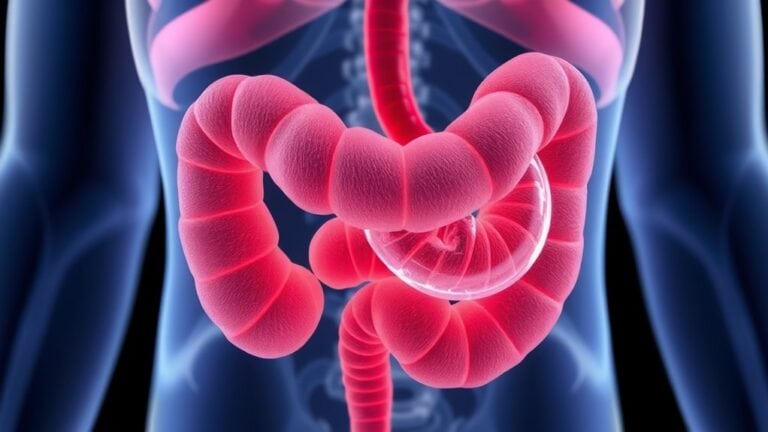You may consider food takes the same time to digest for everyone, but that’s not true—your body processes meals based on what you eat, how active you are, and even your stress levels. Proteins and fats slow things down, while carbs move faster, and dehydration or a sedentary lifestyle can throw off the whole system. Your gender, age, and gut health also play a part, making digestion as unique as you are. Curious how these factors affect you? Let’s break it down.
Type of Food and Its Impact on Digestion Speed
Depending on what you eat, your digestion could speed up or slow down—sometimes by hours. The type of food you choose plays a big role in digestion speed.
Proteins and fats, like meat or cheese, take longer—sometimes over two hours—because your body breaks them down slowly. Simple carbs, such as white bread, digest fast, often in under an hour, but they leave you hungry sooner.
Fiber-rich foods, like veggies and whole grains, keep things moving smoothly, balancing speed and fullness. Processed snacks could rush through your system, but they don’t fuel you well.
Dense meals linger in your stomach, while lighter options pass quicker. Your digestive process adapts to what you feed it, so pick wisely to feel your best.
How Gender Influences Digestive Transit Times
You may not realize it, but your gender can actually affect how quickly you digest food.
Men often process meals faster than women, partly due to differences in hormones and body composition.
Your digestive speed can also shift with age, adding another layer to how your body handles meals.
Men Vs Women Differences
While digestion might seem like a universal process, men and women actually experience it differently—and it’s not just about what one eats.
Men tend to digest food faster, with gastric emptying taking 2–3 hours, while women often need 2–4 hours. This difference likely stems from men’s higher muscle mass and metabolic rates.
Women, on the other hand, face more digestive variability due to hormonal shifts, especially during their menstrual cycle. They’re also more prone to conditions like IBS, which can slow things down.
As women age, menopause can further delay digestion compared to men of the same age.
So in case you’re a woman, don’t stress in case your digestion feels slower—it’s normal.
And men, enjoy your speedy metabolism while it lasts!
Hormonal Impact on Digestion
Hormones play a bigger role in digestion than you might consider, especially at the time it comes to how quickly food moves through your system. Hormonal fluctuations—like estrogen and progesterone—can slow gastric emptying, meaning meals could sit longer in your stomach during certain phases of your cycle. Women often experience longer digestive transit times than men due to these shifts, while men typically process food faster. Even medications like birth control can tweak your gut’s rhythm.
Here’s how hormones shape digestion:
| Hormone | Effect on Digestion |
|---|---|
| Estrogen | Slows gastric emptying, prolongs transit |
| Progesterone | Relaxes gut muscles, delays movement |
| Testosterone | Tends to speed up digestion slightly |
Your body’s hormonal balance quietly steers how you digest food—so what feels like a “slow” day could just be chemistry at work.
Age and Gender Variation
Several key factors influence how quickly your body processes food—and gender plays a bigger role than many realize. Men often digest food faster than women, partly due to differences in metabolism and body composition.
Women’s digestion can slow down because of hormonal shifts, especially during their menstrual cycle, and they’re more likely to experience digestive issues like IBS. As you age, digestion naturally slows for both genders, but women might notice these changes earlier due to hormonal shifts like menopause.
Your genes also play a part, affecting how efficiently your body breaks down food. While you can’t change your age or gender, comprehending these differences helps you tailor your diet and habits for better digestion.
The Role of Hydration in Digestive Efficiency
You may not realize it, but drinking enough water speeds up your digestion by helping food move smoothly through your system.
It also makes it easier for your body to absorb nutrients, since water keeps digestive enzymes working their best.
Should you skimp on fluids, you could end up feeling sluggish or bloated as your digestion slows down.
Water and Digestion Speed
Since digestion relies heavily on fluids, staying hydrated keeps everything moving smoothly.
Water speeds up digestion by helping your stomach and intestines process food efficiently. As you drink enough, it softens stool and prevents constipation, making bowel movements easier. Your body also needs hydration to produce digestive juices, which decompose food faster. Without enough water, digestion slows, leaving you bloated or uncomfortable.
Plain water leaves your stomach in just 10 to 20 minutes, so sipping throughout the day helps maintain rhythm. Include hydrating foods like cucumbers or oranges to boost fluid intake. Dehydration can clog the system, so listen to your body’s thirst signals.
Keep a water bottle handy, especially during meals, to support smooth digestion.
Hydration and Nutrient Absorption
Water plays a key role in helping your body absorb nutrients effectively. Staying hydrated guarantees your digestive juices flow smoothly, breaking down food so your intestines can pull out vitamins and minerals.
Without enough water, nutrient absorption slows, leaving you missing out on the goodness in your meals. Drinking water before or during meals also helps soften food, making it easier for enzymes to do their job.
Dehydration thickens stools, leading to constipation and sluggish digestion. Aim for about 2 liters daily to keep things moving. Sipping water consistently is better than gulping it all at once—your digestive system prefers a steady supply.
Should you be feeling bloated or sluggish after eating, check your hydration initially. Small changes make a big difference!
Physical Activity and Its Effect on Digestion
Though digestion can seem automatic, physical activity plays a surprisingly direct role in how efficiently your body processes food. Moving your body helps speed up transit time, keeping your digestive system running smoothly. A short walk after meals can kickstart muscle contractions in your gut, reducing bloating and discomfort. But timing and intensity matter—too much too soon can backfire.
| Activity Level | Effect on Digestion | Best Timing |
|---|---|---|
| Sedentary | Slower transit time | N/A |
| Walking | Boosts gut motility | After meals |
| Moderate exercise | Improves nutrient absorption | 30-60 min post-meal |
| High intensity | might delay digestion | Avoid right after eating |
| Regular movement | Supports long-term gut health | Daily |
Light activity keeps things moving, while overdoing it can stall digestion. Balance is key.
Managing Stress for Optimal Digestive Health
Your gut doesn’t just react to what you eat—it responds to how you feel, too.
Stress can mess with digestion by slowing gut movement and cutting down enzyme production, leaving you bloated or constipated. High cortisol levels from chronic stress may also weaken nutrient absorption.
To keep digestive health on track, try stress-busting habits like deep breathing or yoga—they calm your mind and help your gut work smoother. Regular exercise is another win; it eases stress and keeps things moving.
Eating stress-friendly foods like fruits, veggies, and whole grains fuels your gut while keeping mood swings in check.
Small changes, like taking mindful bites or setting aside quiet time, can make a big difference in how your body processes food.
Differences in Digestive Health Among Individuals
Since everyone’s body works a little differently, it’s no surprise that digestion isn’t the same for all of us. Your digestive health depends on factors like genetics, age, and even gender. Health conditions like IBS or diabetes can slow things down, while medications could throw a wrench in the works too. Here’s a quick look at how these differences play out:
| Factor | Impact on Digestion | Example |
|---|---|---|
| Genetics | Efficiency varies | Some metabolize fats faster |
| Age | Slows with time | Older adults digest slower |
| Gender | Men digest quicker | Women might experience bloating |
| Health Conditions | Alters speed | IBS causes constipation |
| Medications | Can delay digestion | Pain relievers slow gut motility |
Your body’s unique quirks mean digestion isn’t one-size-fits-all.
How Meal Composition Alters Digestion Time
What you eat doesn’t just affect how full you feel—it also changes how long your body takes to digest it.
Meal composition plays a huge role in gastric emptying time, which is how quickly food leaves your stomach. Protein-rich foods like meat or fish take longer—sometimes over 6 hours—because they’re harder to digest. Fats, like cheese or fried foods, slow digestion too, often staying in your stomach for 3 to 5 hours.
Carbs, especially simple ones like white bread, digest fastest, sometimes in under an hour. Fiber speeds things up by keeping your gut moving, shortening transit time to about a day or two.
Balancing macronutrients in meals matters—mixed meals usually take 4 to 6 hours to digest.




